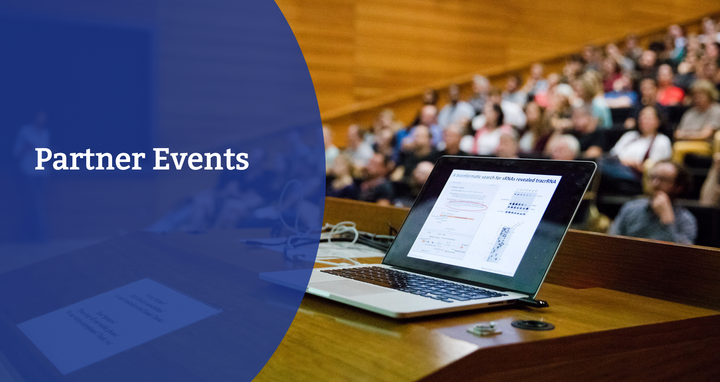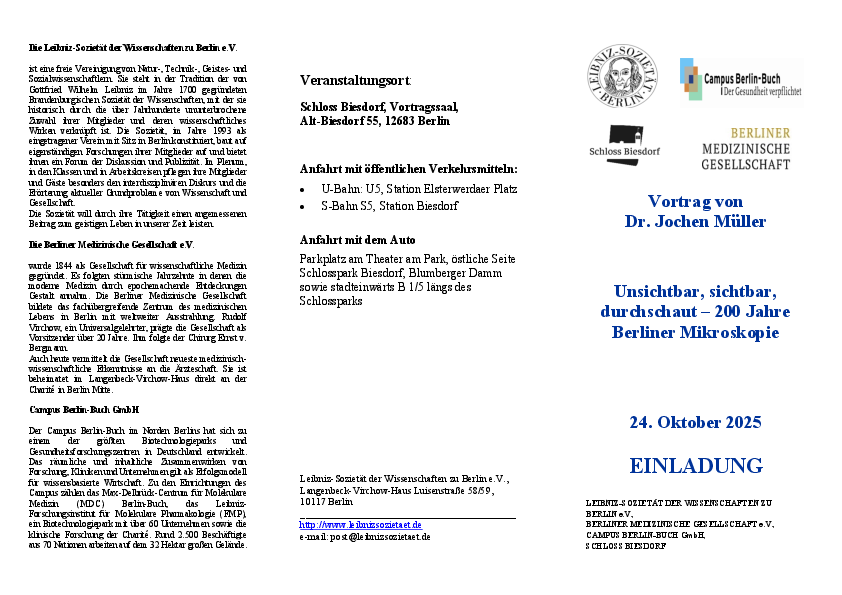Biesdorf Medical Talks
Invisible, Visible, Understood – 200 Years of Microscopy in Berlin
The lecture highlights the unique connection between science and the optical industry that emerged in the Berlin-Brandenburg region at the beginning of the 19th century.
Microscopes—built by Berlin-based mechanics and opticians—were the tools used by Berlin scientists to establish what was then a ground breaking new concept: cell theory (the idea that all organisms are made up of cells). Without the microscope, cells could neither be seen nor understood. Cell theory later became the foundation for cellular pathology, presented by Rudolf Virchow in the mid-19th century, which posits that diseases arise from changes in or between cells—this laid the groundwork for modern biomedicine.
In Berlin, at the end of the 19th century, Wilhelm von Waldeyer-Hartz formulated the neuron theory, which states that the nervous system is made up of small, distinct units: nerve cells.
In the early 20th century, Oscar and Cécile Vogt founded the Kaiser Wilhelm Institute for Neurobiology in Berlin-Buch. Among other things, they developed the theory that a person’s abilities can be inferred from the architecture of their brain—again, microscopes were indispensable for this work. Not least, it was Ernst Ruska who developed the world’s first electron microscope in Berlin.
The lecture presents these ground breaking developments and their significance for biology and medicine. It also touches on subsequent advances, such as the introduction of general meat inspection and the development of the first commercially available movie projector.
About the speaker:
Jochen Müller studied biology in Göttingen and earned his doctorate in cellular neuroscience at the Max Delbrück Center for Molecular Medicine (MDC) in Berlin-Buch. He then worked as a postdoctoral researcher at the Université de Montréal, Canada, and at the Institute for Experimental Neurology at Charité – Universitätsmedizin Berlin. His research focused on neuro-glia interactions and stroke diagnostics.
Since 2011, Jochen Müller has worked as a science journalist (including for ZEIT Wissen and dasgehirn.info), author (“Ich glaub, mich trifft der Schlag”), and moderator (e.g., at Urania Berlin).
For Campus Berlin-Buch, he curated (under Prof. Helmut Kettenmann) the exhibition on the history of microscopy in Berlin and Brandenburg, as well as the MDC’s virtual microscopy exhibition.
He organized and hosted the first science slams in the UK and the US. As a freelance program curator, he organizes and moderates the “Berlin Brains” series at Urania Berlin. For the Einstein Foundation, he leads the “Einstein in the Dome” series at the Zeiss Major Planetarium, the world’s only lecture series with 360° imaging. For Berlin’s Excellence Clusters, he organizes and hosts science slams and the “Excellent Pub Quiz.” For the Planetarium Berlin Foundation, he conceived and produced the themed week "Invisible Worlds: From the Microcosm to the Universe" in April 2025, on the occasion of the International Day of Microscopy.
Opening and welcome by the President – Moderation: Gerhard Pfaff
(In cooperation with the Leibniz Society, the Berlin Medical Society, Campus Berlin-Buch GmbH, and Schloss Biesdorf)
Venue
Schloss Biesdorf,
Vortragssaal, Alt-Biesdorf 55,
12683 Berlin
Germany


